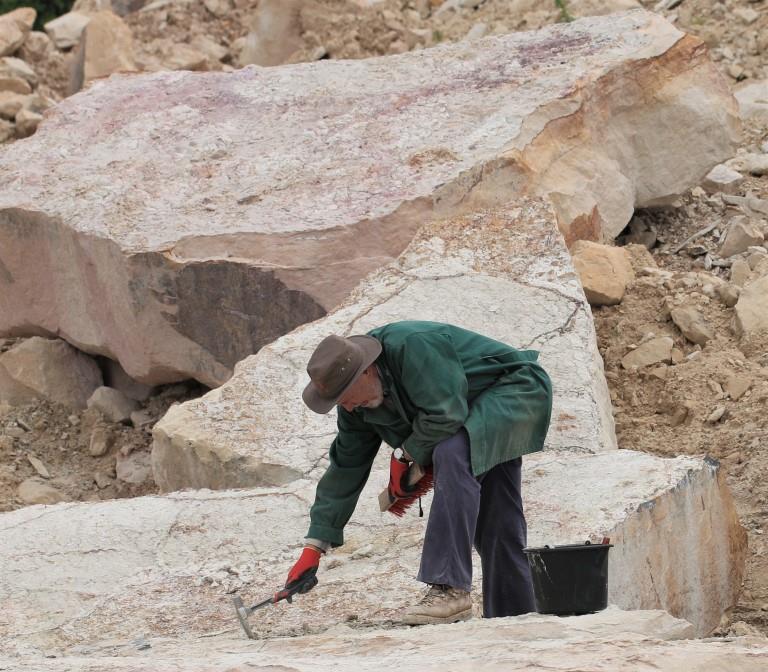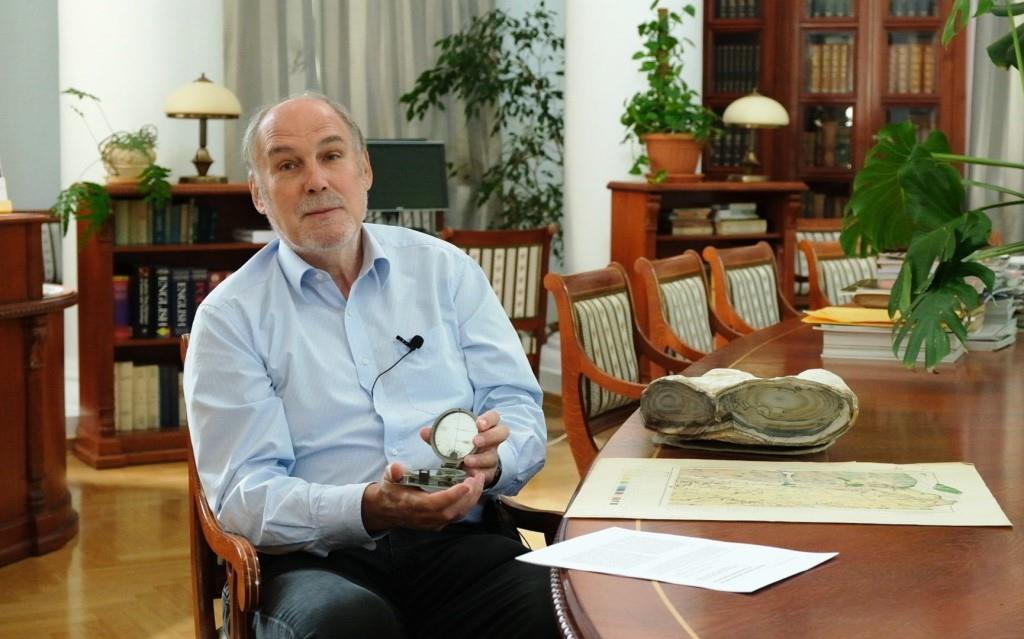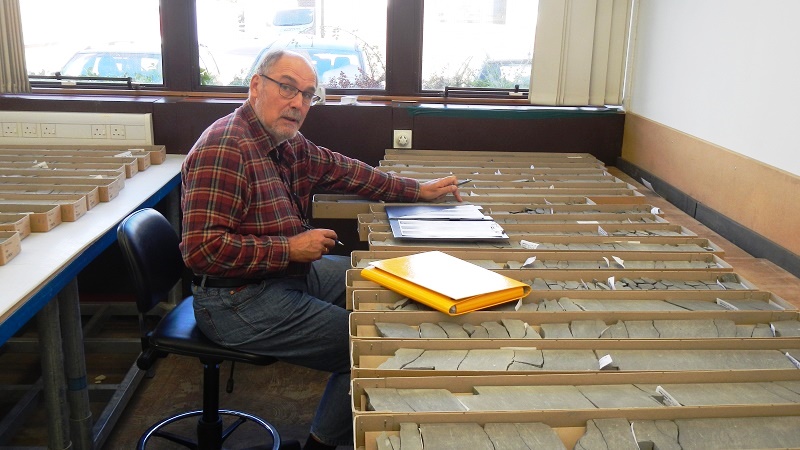 It was with disbelief and deep sadness that we received the news about the death of Professor Grzegorz Pieńkowski – a long-time employee of the Polish Geological Institute. He died on 19 April 2023 at the age of 69.
It was with disbelief and deep sadness that we received the news about the death of Professor Grzegorz Pieńkowski – a long-time employee of the Polish Geological Institute. He died on 19 April 2023 at the age of 69.

The late Professor Grzegorz Pieńkowski during research work at the Borkowice quarry, 2022
Professor Grzegorz Pieńkowski was born on 11 May 1953 in Poznań. In 1976, he graduated with honours from the Faculty of Geology of the University of Warsaw, and in 1978-1980 he completed doctoral studies at his alma mater. He received a doctorate in natural sciences in 1982 based on his doctoral thesis entitled 'Sedimentology of the Lower Lias of the Northern margin of the Świętokrzyskie Mountains', prepared under the supervision of Prof. Piotr Roniewicz.
In 1980, he joined the Polish Geological Institute, with which he was affiliated for almost the next 40 years, not counting a few years' break, when in 1991-1996 he was the Consul General of the Republic of Poland in Sydney, Australia, as an employee of the Ministry of Foreign Affairs. He returned to work at PGI-NRI in 1998.
He was also a visiting professor at the universities of Stockholm and Lund (Sweden) several times between 1984 and 1987 as part of a research project funded by the Swedish Research Council. He was also giving lectures and other teaching activities on sedimentology at these universities.
He was granted the degree of Doctor of Earth Sciences in geology in 2005 at the Jagiellonian University (Faculty of Biology and Earth Sciences) based on the general assessment of his scientific output and thesis entitled 'The Epicontinental Lower Jurassic of Poland'. In 2010 he became an associate professor and in 2013 he was nominated by President Bronisław Komorowski as Professor of Earth Sciences.
As an employee of PGI-NRI, Professor Grzegorz Pieńkowski specialised in multidisciplinary stratigraphy, sedimentology and palaeoecology. He was involved in studies of Palaeogene (Podhale), Jurassic and Cretaceous (Pieniny), Red Carboniferous (Lubuskie Voivodship), Oxfordian and kimmeridic (eastern margin of the Świętokrzyskie Mts.), Upper Permian and Lower Epoontontogenic Triassic in Poland, Upper Triassic (Opolskie Voivodship), and especially the Lower Jurassic epicontinental formations in Poland, Sweden and Romania (sedimentology, sequence stratigraphy, palaeoecology and chemostratigraphy).

Professor Grzegorz Pieńkowski at the Borkowice quarry during fieldwork in 2022
From the beginning of his scientific career, he also dealt with ichnology, first in marine formations, then in terrestrial formations (dinosaur tracks and nests). He worked out stratigraphic-sequence correlation of hetang and synemur formations of Poland and Sweden, later verified by chemostratigraphic methods. He also applied this method for the first time in Poland.
Lower Jurassic exploration finds its application in natural gas storage projects, carbon sequestration (CCS) and clay deposit exploration.
While working at PGI-NRI, Professor Grzegorz Pieńkowski held many managerial positions. He was head of the Laboratory of Oil and Gas Prognoses, in the years 2000-2001 he managed the Geological Museum where he was involved in popularization of geology and geotourism. During this period, he was co-author of the concept of the 'Kamienna Valley' Geopark and the educational project 'Understanding the Earth'. From 2008 to 2011, he was deputy director for scientific affairs and scientific secretary of the Institute, and from 2012 to mid-2013 he was scientific secretary and head of the Climate Change and Environment organisational unit. He also served as director of the Cooperation and Promotion division.

Professor Grzegorz Pieńkowski during an interview about Jan Samsonowicz (Library of the Polish Geological Institute, 2022)
Between 1998 and 1999, the Professor was an advisor to the Minister of the Environment in the Political Cabinet. He was involved in the drafting of the amendment to the Geological and Mining Law, especially as regards the provisions on the state geological survey. He was a co-author of the parliamentary draft amendment to the Law and numerous accompanying documents and drafts.
Professor Grzegorz Pieńkowski has held a number of positions in international research projects. From 2000 he was a member of the Polish Working Group of the Jurassic System, affiliated with the Polish Geological Society, and later a member of the Board of this international group. He was a member of the organising committees of two world scientific congresses: 7th International Congress on the Jurassic System in Cracow and 2nd International Congress on Ichnology in Cracow. In 2010, he was invited to join the scientific committee of the Congress on the Jurassic System in China, and in 2013 to the analogous committee of the next Congress on the Jurassic System in India. He was the chairperson of the European Science and Technology Network on Unconventional Hydrocarbon.
From 2005 to 2010, he was co-leader of IGCP Project 506 'Marine and Non-marine Jurassic: Global Correlation and Major Geological Events'. He was a member of the substantive team of the national CCS project led by PGI-NRI, a voting member of the GSSP (boundary) Triassic-Jurassic team and a corresponding member of the International Subcommission on Jurassic Stratigraphy.
In 2013, he was awarded a large NSC international collaborative research grant (Harmony series) through a competitive process and was also invited to join an international scientific team to prepare the Mochras drilling project in the UK under the ICDP programme.

Professor Grzegorz Pieńkowski during the Mochras core profiling at the BGS headquarters in Keyworth
He was a member of the Scientific Council of the PGI-NRI from 2006 to 2008, as well as a member of the editorial boards of the scientific journals 'Geological Review' and 'Geological Quarterly' (2008-2012) and co-editor of 'Volumina Jurassica'.
The idea of social activity and solidarity was always extremely close to his heart. He was an active member of the independence underground and the Primate's Committee for Aid to Persons Deprived of Liberty and Their Families. Despite the threat of repression, he became a member of the Independent Self-Governing Trade Union 'Solidarity' (NSZZ Solidarność) and was its active advocate until his death. In 1981, he was elected a delegate to the General Assembly of Regions of the 'NSZZ Solidarność'. He was a Chairperson of the NSZZ 'Solidarność' Works Committee at PGI-NRI and the Geological and Drilling Branch Section, and a Delegate to the Congress of the National Secretariat of Natural Resources, Environmental Protection and Forestry of the NSZZ 'Solidarność'. In the communist Security Service (SB) materials preserved at the Institute of National Remembrance (IPN), he is listed as a person under surveillance under the code name 'Jezuita' (Jezuit).
In 2016, in recognition of his struggle against the communist system, the President of the Republic of Poland awarded him the Cross of Freedom and Solidarity, and in 2020 he received the Medal of the Centenary of Regained Independence for his contribution to building and strengthening sovereignty, as well as for his numerous achievements for the development of science in Poland.
For his scientific and organisational activities he was honoured with many state, departmental and other awards: Medal 'Primus Inter Pares' (1975), Award of the Rector of the University of Warsaw of the second degree for a scientific publication (1978), Honorary Medal 'Distinguished for Polish Geology' (2005), Award of the Minister of the Environment for outstanding scientific achievements (2008. ), Gold Medal of the Polish Geological Institute (2021), Gold Cross of Merit (2022), Cross of the Association of Polish Veterans (SPK) awarded by the World Council of the SPK for services to the SPK and numerous special awards of the Director of the PGI-NRI for outstanding scientific achievements and publications. In 2009, he became the Mining Director of the first degree.
He has published nearly 200 papers, including several monographs, map sheets and many publications in ISI-listed journals (most of them foreign). In addition, he has co-authored several major archival studies, numerous newspaper articles and interviews, and co-authored several documents and studies of the Primate's Social Council, of which he was a member from 1986 to 1990.
He was a great lover of sport. He was an excellent skier and volleyball player. He was president of the Geosport sports association of geologists at the PGI-NRI. He repeatedly took part in international sports competitions between European geological surveys.
To his family and loved ones, our deepest sympathy: Directorate, Scientific Council and Employees of the Polish Geological Institute – National Research Institute.














 PGI-NRI offer
PGI-NRI offer Mineral resources of Poland
Mineral resources of Poland  Oil and Gas in Poland
Oil and Gas in Poland 



 Subscribe to RSS Feed
Subscribe to RSS Feed